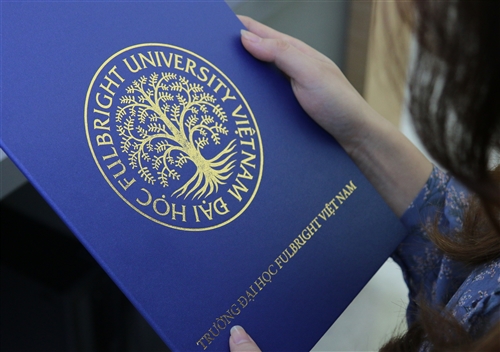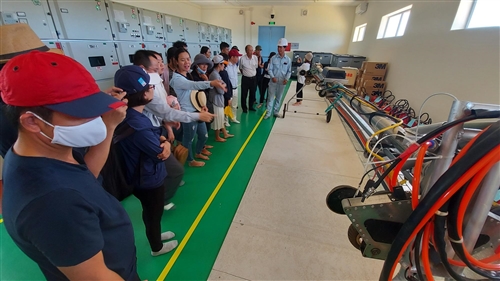Regional and local development is an optional course of the Master in Public Policy program at Fulbright School of Public Policy and Management (FSPPM). Taught by Dr. Vu Thanh Tu Anh, Dean of FSPPM, it is favored by students of both Policy Analysis and Leader & Management concentrations.
Recently, more than 50 students of the MPP2021 class, coming from both concentrations, paid a field visit to Binh Thuan Province as part of the course's curriculum.
This is a course on competitiveness and economic development, taking a bottom-up and microeconomics perspective, based the analytical framework of the Microeconomics of Competitiveness course created by Prof. Michael Porter and colleagues at Harvard Business School. Students have to further incorporate knowledge sourced from various majors, such as Development Economics, Public Sector Economics, Law and Public Administration and International Trade.

The course helps students address the following question: How does a constituency (national government, sub-national government, region, cluster, industry association and others) increases competitivity to achieve development goals?
The course will make an extensive use of case studies, mostly drawn from the FETP/FSPPM and Harvard Business School's case libraries. Before each class, the students are encouraged to read and prepare the case well in advance since a significant part of the course grade will be based on participation. The course also involves a team project in which the team assesses the competitiveness of and makes recommendations for a particular constituency.
In the summer semester of the 2020-2021 school year, public policy students were introduced to various case studies related to economic development in different countries, such as Korea and China, and more local development issues, such as the role of Samsung in the economic development of Thai Nguyen province.
Field visit
The regional and local development course does not only take place inside the classroom with theories and case studies. All the students this summer semester joined a field visit to Binh Thuan Province from June 21-23.
Before the trip, the students conducted research on the provincial economic overview and its competitiveness through the use of unofficial statistics provided by local departments and agencies, recouped with official data available online. During the process of information collection, they held fruitful discussions and exchanged information with local departments and agencies, businesses, and people.

During two short working days, the students then met with officials from the provincial Department of Planning and Investment, Department of Finance, Department of Transport, Department of Industry and Trade, Department of Natural Resources and Environment, and Department of Culture, Sports and Tourism.
They also exchanged information with leading businesses in the province's key industries such as tourism, dragon fruit farming, renewable energy, and logistics. They paid field trips to the tourism are of Bau Cat, as well as the solar power infrastructure project in Hong Phong 4 and the main area cultivating dragon fruit.

The trips helped them better understand the current status, development outlook and the challenges facing Binh Thuan, such as the dependence on the Chinese market for dragon fruit export, the most popular fruit product of Binh Thuan, as well as its unstable price. Other issues include tourism infrastructure, the key industry of Binh Thuan, and especially lacking supplies of clean water; renewable energy's development potential was also identified as being highly dependent on power transmission and distribution networks; meanwhile, the mining industry poses environmental risks; and logistics suffer from incomplete infrastructure.
After the field visit, each student was required to write an essay about Binh Thuan's competitiveness as a whole and the competitiveness of its top industries including tourism, renewable power, dragon fruit and logistics.

The faculty members will compile these essays into a policy analysis document that summarizes the province's competitiveness accompanied by independent policy proposals, aiming to improve the province's competitiveness and support its economic development goals. This document is expected to be useful for local authorities, especially as they prepare documents for the provinces' 14th Party Committee's Congress and Overall Planning.
Related Articles

An education in Public Policy and Management: Affordability vs. Accessibility

Mind-changing learning experience at Fulbright


